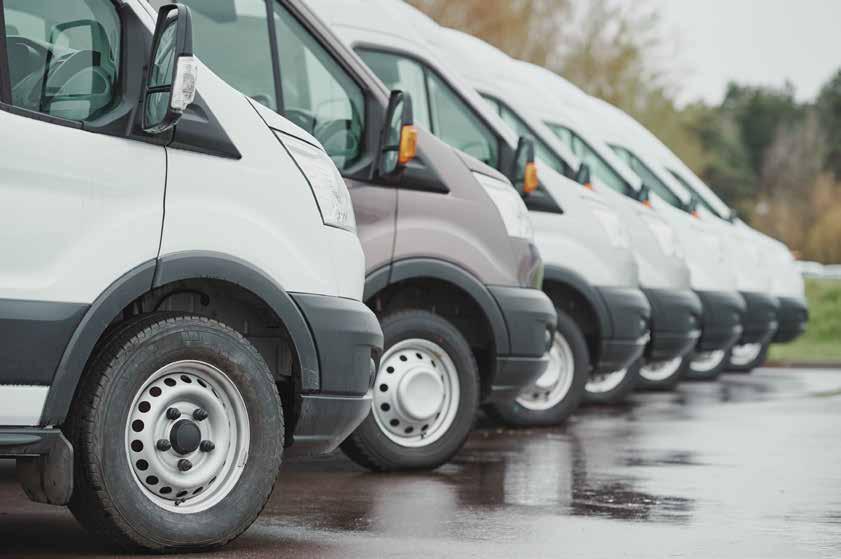With Michele Hanlon, President of the Vehicle Leasing Association of Ireland (VLAI)
“The fleet sector is ever changing and evolving,” said Michele Hanlon, President of the Vehicle Leasing Association of Ireland (VLAI), who is about to complete the first year of her tenure as head of the national body for the Irish fleet management industry.

BIK is very much on Michele’s agenda in her day-to-day activities as Sales Manager at HB Dennis Leasing. She notes that the latest Benefit in Kind (BIK) changes within the Budget Finance Act are possibly and probably the biggest issue and change facing professionals car drivers in recent years. It’s an issue on which Michele and Council members have been actively lobbying Government Ministers and officials on. “The changes to BIK are killing our industry,” she stressed, adding; “The phasing out of the zero percent BIK on Electric Vehicles over the next 4 years, under the Finance Act must be looked at again. The way the Government officials have dealt with the issue is pushing away the move towards electrification of the business car fleet, totally penalising drivers in moving to zero-emission vehicles. In addition, it is missing an opportunity for the motor industry to provide a clean, green, safer and fresher used car market.”
“A rethink is necessary, and we are continuing to seek a fairer way, specific to leasing, with a reduction in the BIK levies. We do realise that there is a cost to cleaning up the environment, but increasing BIK is counter-intuitive. But
being rewarded to cover more miles to reduce rates is counter-productive in terms of reducing carbon footprints. Another consideration is the fact that all cars (and vans) have increased in price substantially, especially BEVs that have longer range distances. Company cars are not a perk but a necessary tool to do business.”
Michele would like to see a broader selection of electric cars becoming available, especially in the smaller car segments: “Not everyone needs a long distance range, so a better line-up of smaller, cheaper cars are needed in the marketplace.”
The VLAI has enjoyed a growth phase in recent years, attracting more members, with many of the bigger fleet management companies becoming major stakeholders and active Council members. Michele stated that “with a full representation from this specialist sector, one strong and singular lobbing focus can be undertaken. There’s strength in numbers.”
Calculating residuals for electric cars is proving difficult, and a risky game. Also, many formulae are involved and taken into consideration. “Currently, the option of petrol/electric hybrids for our operators is not working. For one thing, there is no VAT rebate on the fuel and [they are] more expensive to run from a fleet operational perspective.”
With the Green Party stating that it wants to see less cars on our streets, the alternative options are car sharing or carpooling, developments that are already happening in Europe. It is something that the VLAI membership is looking to get involved in. The issue of actual car ownership, insurance cover, compliance and maintenance could be handled by an organisation like the VLAI, which has experience and expert professionalism in
this area.
Managing the grey fleet is becoming a bigger issue within the industry, and something that Michele and the VLAI are continually trying to address. “Over the years, the option of the driver to own their own car and use it for business or work purposes has increased. The concern lies between undertaking repairs and maintenance and the duty of care involved. We are aware of the cost of living crisis, but if a set of tyres are not replaced, for example, and an accident happens, the insurance cover could be negated. The RSA has issued guidelines but we need clear legislation to be initiated in this country in this regard. In the UK, duty of care comes under Corporate Responsibility, which is a serious matter with severe penalties. Overseeing the management of own account vehicles on behalf of companies is something that we may look at from our side.”
At the 2023 VLAI AGM in April, details of the makeover of the organisation, undertaken over the past few months, will be revealed. It includes a new chain of office, a restyled logo and a totally revamped website. “It’s time to create a new image and refreshed branding to meet our changing times and become more vocal within the business end of the Irish automotive industry.”
She paid special tribute to her predecessor Morgan McAndrew, for overseeing the organisation’s operations during the very difficult pandemic lockdown periods. “Morgan carried us all along during the most challenging period in the motor industry. He was also involved in putting the plan together to carry the VLAI into the future for all members to benefit from.”
With Jarlath Sweeney - editor@fleet.ie
FLEETCAR | SPRING 23 | NEWS 1
78 | INTERVIEW
For the executive corporate car driver who covers above average mileage, the big question is whether to stick with diesel power or move over to zero-emission electric. Eventually this will have to happen but for now to maintain the same premium level of motoring, diesel seems to be the most economical, convenient and viable option.
Take the Mercedes-Benz E-Class , for instance. Comparing the diesel E220d and the electric EQE 350, brings out interesting findings.
Talking with a loyal E-Class driver, a person who hasn’t time for any other car, this is a result of having had consistent love affairs with each generation of the E-Class. The excellent fuel economy of his E220d and numerous driver comforts are top of his conversation agenda every time we meet. Our last chat was on the merits of the new EQE, as the interest inside his head and heart is growing.
Mercedes-Benz EQE+ AMG Line
of 641km. The E220d, on the other hand starts at €68,850 and has a 2.0-litre Euro 6 diesel delivering 200hp/440Nm. With a full tank, it can travel over 1,200km, according to its driver’s figures that record an average consumption of 5.2 l/100km (though at times recording as low as 3.9l/100km).

Delving further into a back-toback analysis, based on the test EQE’s recorded long term average energy consumption figure of 17.5kWh/100 km, it would cost €7.57 for a range of 100km based on current 24 Hour Standard Rate ESB home electricity prices of €0.4327. Whereas the E-Class would cost €9.10 to cover that 100km based on its average fuel consumption figure and current average pump prices of €1.75/litre for diesel. Slightly cheaper for the electric car (provided it is charged at home) but that doesn’t factor in that the diesel car takes only minutes to refill, in contrast to the 32 minutes or longer (depending on fast charger speeds) needed to recharge the EQE up to 80% of the battery pack’s capability/capacity. Note also that it is considerably more expensive to charge at public charge points like those provided by IONITY.
annual motor tax - €120 for the electric versus €390 for the E220d, there is still a big gap between the overall costs associated with the electric over its diesel counterpart.


Granted there are less maintenance costs with electric motors compared to the need to regularly service diesel engines, (not to mention the ongoing AdBlue refills, which are proving more costly these days). But in favour of the diesel power the VAT rate charged can be rebated from Revenue. Changes to BIK rates may also make EVs less appealing than hitherto.
Two key elements are pertinent in the decision on whether to go electric –purchase price and running costs.
Having spent a week on board the EQE 350+ AMG Line late last year, the base price comes in at €85,980 for the similarly sized four door saloon that can be compared as a like-for-like with the E220d. Its 215 kW electric motor and 90 kWh battery pack produce 292hp and 565Nm of torque, while offering a WLTP measured stated range capability
Both are impressive looking machines to look at and drive. Similar in size, their shape differs, with the EQE more akin to the CLS model than its E-Class sibling. It certainly does stand out more on the road and in car parks. The illuminated pop-out door handles are cool and the dash board and large (12”) MBUK interactive touch screen is completely different and new to the E-Class family. The EQE comes loaded with advanced safety and comfort fittings, although we noted that the active brake assist system has a slightly unnatural feel to it initially, until you get used to it. ‘One pedal’ driving is achievable thanks to the variable regenerative braking available in four levels of off, low high and intelligent.
Considering it weighs in at over 2.3 tonnes GVW, the EQE handles surprisingly well, travelling smoothly on all surfaces.
Space inside is not compromised, with plenty of leg room evident and the boot space is adequate at 430 litres.
Even with the difference in the
Up against rivals that include the Tesla S, Prosche Taycan and Audi e-tron GT, the EQE is a well packaged, competent and attractive all-rounder capable of travelling a distance on a single charge that should allay any range anxieties. The only concern is its affordability. And the fact that we could not convince the E220d driver to switch allegiance any time soon!
Text & Photos: Jarlath Sweeney - editor@fleet.ie
Spec c heck
Make/Model: Mercede S -Be
drivetrain: 215kW Electric motor/ 292hp/ 565Nm torque (90kWh battery pack)
WlTp range: 641km
Transmission: Automatic; single-speed; RWD road Tax: €120 (7% VRT/ Band 1)
Base price: €85,980 plus extras: €106,404
www.fleet.ie
N z e Q e+ a MG l i N e
TEST | 79
If the past couple of years have been anni horribiles for the motor industry, as a result of the Covid pandemic and follow-on supply chain difficulties, there are hopes that 2023 will see things change for the better. However many challenges remain, not least for the fleet sector. Fleet Car asked representatives from three different car brands, Audi, Kia and Opel, what their thoughts were on the state of the company car market heading in to the New Year.
F LEET OR P RI vATE - wh AT TA k ES PRIORIT y FOR T h E CAR MANUFACTURERS?
One of the fallouts of the relative shortage of vehicles was that for some manufacturers at least, meeting the needs of private customers was at least as important as fulfilling bulk orders for the fleet and leasing sectors.
A spokesperson for Audi Ireland said that the brand will continue to allocate a portion of its allocation to the fleet sector. “Despite the challenges that the industry faced in 2022, Audi had a very successful year. We recorded another year of leadership in the Premium Market with the market share of over 4%. A very strong order bank for 2023 has led to robust sales in January with market share of 4.8% MTD.”

Audi envisages that its position will remain a positive one over the coming months. “At Audi, all customers are
valued regardless of whether they are private or fleet, every year we ensure a percentage of our total volume is allocated to the fleet channel and there is no proposed change to this process for 2023.”
According to Fleet Sales Manager for Kia Ireland, Maria O’Mahony, the fleet focus remains strong:“Our priorities with respect to the fleet market is to maintain the relationships that have been built over the years and to supply where possible. Kia will continue to offer demonstrations and loan cars where requested.”
Getting vehicles in preferred specifications remains a challenge according to Fergal Marron, Head of Fleet at Opel:: The ongoing supply disruption means placing orders for particular vehicle specifications, volumes and delivery timelines is risky as some or all of these vehicles may not get built exactly as requested.
Hence we tend to order vehicles in standard specifications, and offer customers vehicles as they are actually built, meaning the specifications, costs and lead times are known.”
Fergal added that the fleet side of the business remains important for the Stellantis Group brand. “Opel will continue to supply vehicles, especially vans, to large fleets, who remain key Opel customers, in addition to our retail customers.”
A RE T h E DAyS OF FLEET DISCOUNTS O v ER?
With manufacturers easily able to sell every new vehicle they could get hold of, offering discounts to fleet customers became less of a priority in the last two years. It’s a situation that’s likely to continue into 2023 according to representatives from the various car distributors.
“We are experiencing substantial volatility in raw material, component, labour, energy and transportation costs, meaning there is ongoing substantial price inflation, so we no longer have the margins to offer large discounts to any customers,” explained Opel’s Fergal Marron. “In overall terms all companies are experiencing increasing costs and many have lower sales volumes, meaning the revenue per unit needs to be higher to cover costs so there is unlikely to be a return to pre-Covid levels of fleet discounts in the short term.”
Kia’s Maria O’Mahony concurs: “Yes, I feel that this will continue in 2023 as manufacturers are passing on increased production costs to distributors.

FLEETCAR | SPRING 23
80 | MARKETPLACE - CAR SECTOR
Some optimism, but challenges remain for fleet sector in 2023
Increased costs are impacting on margins for vehicles which makes it increasingly difficult to offer incentives and discounts. Shortage in supply and high demand for vehicles also means that it is impractical to offer discounts in these economic times.”
Audi Ireland points to a dedicated service it offers for fleet customers: “VW Group Ireland / Audi Ireland launched the Fleet Agency Program from the 1st of Aril 2022 which offer competitive trading terms. This program is continuing throughout 2023.”
hO w SIGNIFICANT ARE T h E C h ANGES TO BI k GOING TO BE?
One of the big concerns for the fleet sector heading into the New Year are the revisions to the benefit-in-kind (BIK) criteria, with fears that running company cars may no longer be attractive to many employees, leading in turn to an increase in the use of older, more polluting cars that are not as well maintained. It’s a concern that the car distributors agree can have the opposite result of reducing emissions that the Government hopes to achieve.
“The feedback that we are getting from our lease customers regarding the change to BIK raises serious concerns for the company car market in 2023,” replied the spokesperson from Audi

have the opposite effect on reducing emissions.”
Maria O’Mahony sees the impact as being more gradual: “I think the impact will not be fully felt in 2023 as there are many outstanding fleet orders and pent-up demand in the fleet channels. Many larger companies have adopted a green policy which means drivers must get an electric vehicle as a company car.
Yes, I absolutely feel that the Government should be doing more to encourage the use of company cars and recent budgetary changes in reducing grants for individuals and removing grants completely for companies and increasing BIK rates have all gone against promoting greener cars. These measures will promote grey fleet where it will be more beneficial for an employee to drive their own car and claim mileage – these cars will be older and less green.”
“Like any measure that has an effect on a worker’s take-home pay, BIK is being examined closely to determine the vehicle with the lowest impact,” notes Fergal Marron. “While it is acknowledged that changes to taxation can influence behaviour and these measures are designed to push people into lower-emission vehicles, it is unfortunate that the real effect of this change is to add more cost to businesses and working people driving vehicles, especially while at the same time efforts are being made
While interest in electric vehicles continues to grow, does the industry feel that the fleet sector is keeping pace with the demand from private buyers? Fergal Marron feels that the reduction and eventual elimination of zero percent BIK on EVs could have a detrimental effect: “There was considerable uptake of EVs by company car drivers while the BIK was zero but as this advantage declines over the next few years company car drivers are looking back to ICE if that is more cost-effective for them.”
He notes the need for infrastructure to improve: “Post lockdown as people are travelling more, EV range and more relevantly charging infrastructure is becoming increasingly important, especially where drivers are not able to charge at their homes overnight. These infrastructural challenges are a barrier to more widespread uptake as relatively long charging times mean more vehicle (and employee) down time.”
Infrastructure challenges are also noted by Audi Ireland. “There is a definite move towards electric within the entire market, including the fleet sector,” the spokesperson told Fleet Car. “However, due to their business requirements fleet drivers potentially travel longer distances and the charging infrastructure will have to improve over coming years to give all drivers the confidence to switch to BEV models.”
Ireland. “With the new regulations, the benefit-in-kind tax is going to more than double for those who receive a vehicle from their employer for the purpose of business travel. This along with the increase in cost of living and continuing increase in the cost of funds (which impacts on the monthly vehicle repayments) will force some drivers to have to give up their cars. Another impact reported to us is that some employees are moving away from company vehicles and utilising car allowances to buy an older vehicle which will have higher emissions. This shift will
to reduce the cost of doing business here, and to ease the cost-of-living burdens on individuals.
Another challenge is that at a certain taxation point employees may opt out of company car schemes altogether where a cash allowance is offered instead, meaning they would then drive vehicles for their work that may not be fit for purpose and are less likely to be more modern, lower-emitting models, which could increase risk and cause higher overall emissions than if they were driving newer, safer, cleaner models,” added Fergal.
Vehicle supply is the biggest challenge that Maria O’Mahony sees preventing fleet buyers from moving to EVs in 2023. ““The move to electric vehicles has been equally adopted by company car drivers and private purchasers. We have seen several small fleet businesses buy electric vehicles. We have also noted a few leasing companies and fleets take up PHEV vehicles. However this move was partially due to shortage in available supply of vehicles where ICE diesel alternatives were not available any longer. This may change in 2023 with the changes in BIK rates and also the review of available grants in the second half of the year.
The challenges preventing fleets moving to electric vehicles are mainly due to vehicle availability, range concerns, charging infrastructure including staff home charging challenges in apartment settings.,” concluded Maria.
www.fleet.ie MARKETPLACE - CAR SECTOR | 81
hO
w q UIC k Ly IS T h E FLEET MAR k ET MO v ING TO E vS?
Text and Photos: Cathal Doyle - cathal@fleet.ie
As electric motoring becomes more and more mainstream, it’s natural that problems will arise as the new technology is introduced. Sometimes though, obstacles seem to be raised just for the sake of it, while at other times it seems that a lack of forethought and bigger picture planning create issues that could be easily avoided.
An example of the former happened when I was test-driving the Ford E-Transit reviewed elsewhere on these pages. As is the case with most electric vehicles issued to journalists for review, Ford had provided a charge card with the vehicle - in this case, one from ESB eCars - to enable those testing it to recharge at public charging stations.
Stopping to recharge, and holding the supplied card up to the fast charger unit, it verified that the card was authorised, however, the machine refused to release the cable from the charge box. Contacting ESB eCars to report the problem revealed that as I wasn’t able to confirm the name under whom the charge card was registered,
they were unable to help me resolve the issue because, I was told, of GDPR regulations. Even though the issue was clearly with the machine, not a problem with the card.
Which does seem a bit nonsensical insofar as there is no restriction or requirement to verify the card’s details to use a public charger, other than having enough credit on the card. In this case I waited for a second charge point to become available before continuing on my way, but what of a scenario where there was no other charger and you hadn’t sufficient range to travel further?
We N eed B e TT er pu B lic rechar G i NG facili T ie S
Having to recharge the E-Transit again highlighted the poor design and location of public charge points which typically seem to be just thrown up without any regard to the people and vehicles using them. Trying to fit a large panel van into a space designed for a car meant on one occasion having to give up and continue on to another location, while another time I had no choice but to partially block an exit lane as it was the only way to connect the cable.
In addition to poorly designed spaces, why are new charge points continuing to be installed in out of the way locations that are exposed to the elements and are often poorly lit? It’s

doubtful if there is a single petrol station in the country that isn’t protected by an overhead canopy, whereas is there even a single EV public charge point with one? Surely, now is the time to be investing in proper facilities to cater for the burgeoning growth in electric vehicle sales? As I write this, there are reports that the Government is set to announce a €100m nationwide EV charging plan - let’s hope that plan factors in properly designed facilities to cater for EVs of all sizes.
p rice of elec T rici T y M ake S e VS a S expe NS i V e To ru N a S ice V ehicle S
The price of petrol and diesel has thankfully come down from record highs in recent weeks, but the same cannot be said of electricity prices - including those applied at EV public chargers. Considering that a key selling point of electric vehicles is that they are cheap to run, comparing, insofar as one can, how much it currently costs to cover 100km in an electric vehicle compared to an ICE one is rather sobering.
Obviously there are a lot of variables, and prices are continually changing, but if you assume an average electric vehicle returns a fuel consumption figure of 19kWh/100 km, and you charge it at, for example, an ESB eCars 50kW fast charger on Pay As You Go current rates of €0.647/ kWh (one of the cheaper fast charger rates presently available), a 100km range will cost €12.29. Charging at home at the ESB’s cheapest night time rate of €0.228 will cost €4.33, while current 24 Hour Standard Rate ESB home electricity prices of €0.4327 would cost €8.22.
Compare that with a petrol car that averages 5.5l/100km (which you could reasonably expect a modern car to do), and it will cost €8.80 to cover those 100km at current petrol prices of roughly €1.60 per litre.
So with prices as they are right now, it arguably costs as much to home charge an EV on standard rate electricity as it does to run an equivalent petrol car, while charging at a fast or rapid public charger could be almost one and a half times as expensive as running an ICE vehicle. Fuel for thought….
FLEETCAR | SPRING 23 | NEWS 1
82 | CONTEMPLATIONS Text and Photo: Cathal Doyle - cathal@fleet.ie
The challenges - and costs - of being an EV driver






Networking is an investment in your business! ThurSday NoVeMBer 9 www.fleet.ie Attend the Fleet Transport Awards & Networking Event and yield great results for years to come... your road to success f or Spo NS or S hip a N d Ticke T Booki NGS plea S e co NTac T: O RLA S WEENEY | T: +353 86 2439239 | ORLA @ FLEET.IE MARY M ORRISSEY | T: +353 87 2178495 | MARY @ FLEET.IE TRANSPORT Engaging Connectivity www.fleet.ie AWARDS 2023 Thursday 9 November 2023, Johnstown estate hotel, enfield, co. Meath


TRY OUR NEW ONLINE PORTAL FOR AN INSTANT QUOTE AND APPLICATION CAPITALFLOW Fast Fleet Finance Available for all transport vehicles funding from €5,000 up up to 100% on new and used vehicles competitive rates quick decisions & execution ronan.kelly@capitalflow.ie capitalflow.ie 01-5632400



















